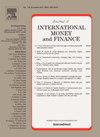Early-Life currency crises and exchange rate pass-through: Understanding the impact of central Bankers’ formative years in Africa
IF 3.3
2区 经济学
Q2 BUSINESS, FINANCE
引用次数: 0
Abstract
This study creates a novel dataset to explore the impact of past exposures to currency crises on the exchange rate pass-through (ERPT) to inflation for 26 African countries between 1989 and 2020. We posit that central bankers who have encountered currency crises during their formative years tend to develop more hawkish monetary preferences and exhibit greater risk aversion, thereby bolstering the credibility of monetary policy. Consequently, we hypothesize that past exposures to currency crises should be associated with smaller exchange rate pass-through elasticities. Our empirical analysis lends credence to this hypothesis; we find that as the number of exposures increases, there is a negative relationship between inflation and exchange rate pass-through for African central bankers who have experienced currency crises within the first 25 years of their lives. Furthermore, our findings remain robust even after controlling for measures of central bankers’ expertise, underscoring the enduring influence of early-life experiences on the ERPT-inflation nexus. Additionally, we find that, in an African context, past experiences exert a statistically significant impact on the exchange rate pass-through to inflation nexus compared to alternative measures of credibility, such as legal central bank independence, which do not have any effect.
早期的货币危机和汇率传递:了解非洲中央银行家形成时期的影响
本研究创建了一个新的数据集,以探讨1989年至2020年间26个非洲国家过去的货币危机敞口对汇率传递(ERPT)对通货膨胀的影响。我们假设,在其形成时期遭遇货币危机的央行行长倾向于发展更鹰派的货币偏好,并表现出更大的风险厌恶,从而增强了货币政策的可信度。因此,我们假设过去对货币危机的暴露应该与较小的汇率传递弹性有关。我们的实证分析证实了这一假设;我们发现,随着风险敞口数量的增加,对于在人生的前25年内经历过货币危机的非洲央行行长来说,通胀与汇率传递之间存在负相关关系。此外,即使在控制了央行行长的专业知识之后,我们的研究结果仍然稳健,强调了早期生活经历对erpt -通胀关系的持久影响。此外,我们发现,在非洲的背景下,过去的经验对汇率传递到通货膨胀关系产生了统计上显著的影响,而可信度的替代措施,如合法的中央银行独立性,则没有任何影响。
本文章由计算机程序翻译,如有差异,请以英文原文为准。
求助全文
约1分钟内获得全文
求助全文
来源期刊

Journal of International Money and Finance
BUSINESS, FINANCE-
CiteScore
4.20
自引率
4.00%
发文量
141
期刊介绍:
Since its launch in 1982, Journal of International Money and Finance has built up a solid reputation as a high quality scholarly journal devoted to theoretical and empirical research in the fields of international monetary economics, international finance, and the rapidly developing overlap area between the two. Researchers in these areas, and financial market professionals too, pay attention to the articles that the journal publishes. Authors published in the journal are in the forefront of scholarly research on exchange rate behaviour, foreign exchange options, international capital markets, international monetary and fiscal policy, international transmission and related questions.
 求助内容:
求助内容: 应助结果提醒方式:
应助结果提醒方式:


